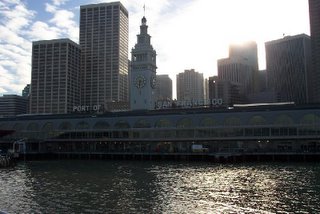Saturday, January 28, 2006
Wednesday, January 18, 2006
Just Say No.........To Wal-Mart
You know if more people stood up to them, they wouldn't be so pushy...........
This is a news story that I read today.........
What struck Jim Wier first, as he entered the Wal-Mart vice president's office, was the seating area for visitors. "It was just some lawn chairs that some other peddler had left behind as samples." The vice president's office was furnished with a folding lawn chair and a chaise lounge.
And so Wier, the CEO of lawn-equipment maker Simplicity, dressed in a suit, took a seat on the chaise lounge. "I sat forward, of course, with my legs off to the side. If you've ever sat in a lawn chair, well, they are lower than regular chairs. And I was on the chaise. It was a bit intimidating. It was uncomfortable, and it was going to be an uncomfortable meeting."
It was a Wal-Mart moment that couldn't be scripted, or perhaps even imagined. A vice president responsible for billions of dollars' worth of business in the largest company in history has his visitors sit in mismatched, cast-off lawn chairs that Wal-Mart quite likely never had to pay for.
The vice president had a bigger surprise for Wier, though. Wal-Mart not only wanted to keep selling his lawn mowers, it wanted to sell lots more of them. Wal-Mart wanted to sell mowers nose-to-nose against Home Depot and Lowe's.
"Usually," says Wier, "I don't perspire easily." But perched on the edge of his chaise, "I felt my arms getting drippy."
Wier took a breath and said, "Let me tell you why it doesn't work."
Tens of thousands of executives make the pilgrimage to northwest Arkansas every year to woo Wal-Mart, marshaling whatever arguments, data, samples, and pure persuasive power they have in the hope of an order for their products, or an increase in their current order. Almost no matter what you're selling, the gravitational force of Wal-Mart's 3,811 U.S. "doorways" is irresistible. Very few people fly into Northwest Arkansas Regional Airport thinking about telling Wal-Mart no, or no more.
The Snapper Difference
In 2002, Jim Wier's company, Simplicity, was buying Snapper, a complementary company with a 50-year heritage of making high-quality residential and commercial lawn equipment. Wier had studied his new acquisition enough to conclude that continuing to sell Snapper mowers through Wal-Mart stores was, as he put it, "incompatible with our strategy. And I felt I owed them a visit to tell them why we weren't going to continue to sell to them."
Selling Snapper lawn mowers at Wal-Mart wasn't just incompatible with Snapper's future -- Wier thought it was hazardous to Snapper's health. Snapper is known in the outdoor-equipment business not for huge volume but for quality, reliability, durability. A well-maintained Snapper lawn mower will last decades; many customers buy the mowers as adults because their fathers used them when they were kids. But Snapper lawn mowers are not cheap, any more than a Viking range is cheap. The value isn't in the price, it's in the performance and the longevity.
You can buy a lawn mower at Wal-Mart for $99.96, and depending on the size and location of the store, there are slightly better models for every additional $20 bill you're willing to put down -- priced at $122, $138, $154, $163 and $188. That's six models of lawn mowers below $200. Mind you, in some Wal-Marts you literally cannot see what you are buying; there are no display models, just lawn mowers in huge cardboard boxes.
The least expensive Snapper lawn mower -- a 19-inch push mower with a 5.5-horsepower engine -- sells for $349.99 at full list price. Even finding it discounted to $299, you can buy two or three lawn mowers at Wal-Mart for the cost of a single Snapper.
If you know nothing about maintaining a mower, Wal-Mart has helped make that ignorance irrelevant: At even $138, the lawn mowers at Wal-Mart are cheap enough to be disposable. Use one for a season, and if you can't start it the next spring (Wal-Mart won't help you out with that), put it at the curb and buy another one. That kind of pricing changes not just the economics at the low end of the lawn-mower market, it changes expectations of customers throughout the market. Why would you buy a walk-behind mower from Snapper that costs $519? What could it possibly have to justify spending $300 or $400 more?
That's the question that motivated Jim Wier to stop doing business with Wal-Mart. Wier is too judicious to describe it this way, but he looked into a future of supplying lawn mowers and snowblowers to Wal-Mart and saw a whirlpool of lower prices, collapsing profitability, offshore manufacturing and the gradual but irresistible corrosion of the very qualities for which Snapper was known. Jim Wier looked into the future and saw a death spiral.
Wier had two things going for him: First, he had another way to get his lawn mowers to customers -- a well-established network of independent lawn-equipment dealers that accounted for 80 percent of Snapper's sales. And Wier had the courage, the foresight, to take an unblinking view of where his Wal-Mart business was heading -- not in year three, or year four, but year 10.
Wier traveled to Bentonville with a firm grasp of the values of Snapper, the dynamics of the lawnmower business, the needs of the dealers, the needs of the Snapper customer, and the needs of the Wal-Mart customer. He was not dazzled by the tens of millions of dollars' worth of lawn mowers Wal-Mart was already selling for Snapper; he was not deluded about his ability to beat Wal-Mart at its own game, to somehow resist the price pressure. He was not imagining that he could take the sales now and figure out the profits later.
Jim Wier believed that Snapper's health -- indeed, its very long-term survival -- required that it not do business with Wal-Mart.
This is a news story that I read today.........
What struck Jim Wier first, as he entered the Wal-Mart vice president's office, was the seating area for visitors. "It was just some lawn chairs that some other peddler had left behind as samples." The vice president's office was furnished with a folding lawn chair and a chaise lounge.
And so Wier, the CEO of lawn-equipment maker Simplicity, dressed in a suit, took a seat on the chaise lounge. "I sat forward, of course, with my legs off to the side. If you've ever sat in a lawn chair, well, they are lower than regular chairs. And I was on the chaise. It was a bit intimidating. It was uncomfortable, and it was going to be an uncomfortable meeting."
It was a Wal-Mart moment that couldn't be scripted, or perhaps even imagined. A vice president responsible for billions of dollars' worth of business in the largest company in history has his visitors sit in mismatched, cast-off lawn chairs that Wal-Mart quite likely never had to pay for.
The vice president had a bigger surprise for Wier, though. Wal-Mart not only wanted to keep selling his lawn mowers, it wanted to sell lots more of them. Wal-Mart wanted to sell mowers nose-to-nose against Home Depot and Lowe's.
"Usually," says Wier, "I don't perspire easily." But perched on the edge of his chaise, "I felt my arms getting drippy."
Wier took a breath and said, "Let me tell you why it doesn't work."
Tens of thousands of executives make the pilgrimage to northwest Arkansas every year to woo Wal-Mart, marshaling whatever arguments, data, samples, and pure persuasive power they have in the hope of an order for their products, or an increase in their current order. Almost no matter what you're selling, the gravitational force of Wal-Mart's 3,811 U.S. "doorways" is irresistible. Very few people fly into Northwest Arkansas Regional Airport thinking about telling Wal-Mart no, or no more.
The Snapper Difference
In 2002, Jim Wier's company, Simplicity, was buying Snapper, a complementary company with a 50-year heritage of making high-quality residential and commercial lawn equipment. Wier had studied his new acquisition enough to conclude that continuing to sell Snapper mowers through Wal-Mart stores was, as he put it, "incompatible with our strategy. And I felt I owed them a visit to tell them why we weren't going to continue to sell to them."
Selling Snapper lawn mowers at Wal-Mart wasn't just incompatible with Snapper's future -- Wier thought it was hazardous to Snapper's health. Snapper is known in the outdoor-equipment business not for huge volume but for quality, reliability, durability. A well-maintained Snapper lawn mower will last decades; many customers buy the mowers as adults because their fathers used them when they were kids. But Snapper lawn mowers are not cheap, any more than a Viking range is cheap. The value isn't in the price, it's in the performance and the longevity.
You can buy a lawn mower at Wal-Mart for $99.96, and depending on the size and location of the store, there are slightly better models for every additional $20 bill you're willing to put down -- priced at $122, $138, $154, $163 and $188. That's six models of lawn mowers below $200. Mind you, in some Wal-Marts you literally cannot see what you are buying; there are no display models, just lawn mowers in huge cardboard boxes.
The least expensive Snapper lawn mower -- a 19-inch push mower with a 5.5-horsepower engine -- sells for $349.99 at full list price. Even finding it discounted to $299, you can buy two or three lawn mowers at Wal-Mart for the cost of a single Snapper.
If you know nothing about maintaining a mower, Wal-Mart has helped make that ignorance irrelevant: At even $138, the lawn mowers at Wal-Mart are cheap enough to be disposable. Use one for a season, and if you can't start it the next spring (Wal-Mart won't help you out with that), put it at the curb and buy another one. That kind of pricing changes not just the economics at the low end of the lawn-mower market, it changes expectations of customers throughout the market. Why would you buy a walk-behind mower from Snapper that costs $519? What could it possibly have to justify spending $300 or $400 more?
That's the question that motivated Jim Wier to stop doing business with Wal-Mart. Wier is too judicious to describe it this way, but he looked into a future of supplying lawn mowers and snowblowers to Wal-Mart and saw a whirlpool of lower prices, collapsing profitability, offshore manufacturing and the gradual but irresistible corrosion of the very qualities for which Snapper was known. Jim Wier looked into the future and saw a death spiral.
Wier had two things going for him: First, he had another way to get his lawn mowers to customers -- a well-established network of independent lawn-equipment dealers that accounted for 80 percent of Snapper's sales. And Wier had the courage, the foresight, to take an unblinking view of where his Wal-Mart business was heading -- not in year three, or year four, but year 10.
Wier traveled to Bentonville with a firm grasp of the values of Snapper, the dynamics of the lawnmower business, the needs of the dealers, the needs of the Snapper customer, and the needs of the Wal-Mart customer. He was not dazzled by the tens of millions of dollars' worth of lawn mowers Wal-Mart was already selling for Snapper; he was not deluded about his ability to beat Wal-Mart at its own game, to somehow resist the price pressure. He was not imagining that he could take the sales now and figure out the profits later.
Jim Wier believed that Snapper's health -- indeed, its very long-term survival -- required that it not do business with Wal-Mart.
Tuesday, January 17, 2006
Where are the resignation seekers now?
NEW ORLEANS - Mayor Ray Nagin apologized Tuesday for a Martin Luther King Day speech in which he predicted that New Orleans would be a "chocolate" city once more and asserted that "God was mad at America."
So why isn't everybody asking for his resignation? Just the other day, before this was a new story I was going to post about why whenever someone says something that might have offended anybody (which is silly because whatever anyone says can offend up to 1/2 of the population these days) they ask for his resignation. (there have been numerous occasions of this in the past 16 years)
You know I'm not much of a "Policically Correct" person, and I do believe that people have a right to their opinions, why isn't this concept applied fairly?
"Right" or "Wrong" I think people have a right to their opinions.
So why isn't everybody asking for his resignation? Just the other day, before this was a new story I was going to post about why whenever someone says something that might have offended anybody (which is silly because whatever anyone says can offend up to 1/2 of the population these days) they ask for his resignation. (there have been numerous occasions of this in the past 16 years)
You know I'm not much of a "Policically Correct" person, and I do believe that people have a right to their opinions, why isn't this concept applied fairly?
"Right" or "Wrong" I think people have a right to their opinions.









